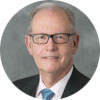Download PDF

Like most medical students, I was convinced that I would choose for a career whichever specialty I was currently assigned. When I was on ob-gyn, I was sure that was my calling. The same was true for cardiology, vascular surgery, pediatrics, and (ultimately) ophthalmology. I also loved infectious diseases—really loved infectious diseases. But when I told my attending this, he said (and I paraphrase) “I wouldn’t go into it now. There are no new diseases, and the antimicrobials we’ve got work well. There are just no real clinical challenges left.”
So much for that.
Since that time, we’ve had Legionnaires disease, HIV-related diseases, H5N1, SARS, MERS, Ebola, prion diseases, flesh-eating bacteria, MRSA and other emerging patterns of drug resistance, resurgences of measles and polio, West Nile virus, Lyme disease, bacterial causes for presumed chronic inflammatory conditions, and many other infectious disease challenges.
And now, in an era of gene therapy, stem cell research, monoclonal antibody technology, siRNA molecules, CRISPR technology, personalized medicine, and big data, our shortcomings have been spotlighted by a tiny virus.
SARS-CoV-2 is not as lethal as SARS-CoV-1, nor is it as contagious as measles. Its onset is generally not as rapid as Ebola or as indolent as prion diseases. Yet the combination of transmissibility, lethality, incubation period, and lack of a specific vaccine or treatment has killed over one-half million people, dooms thousands more each day, and brought global commerce to a virtual halt.
As our tragic experience with the virus matures, we are coming to appreciate some of the more insidious legacies of the disease—medical, economic, and cultural. Many of the survivors have permanent myocardial damage and deficits from thrombotic strokes. Some of our world’s most vulnerable citizens have to choose between, on the one hand, sheltering and hunger and, on the other, working and an increased risk of death. Entire sectors of the economy are at risk of collapse—along with the jobs they provide. And the psychological stresses, the personal isolation, and fraying of the general social fabric has led to increases in certain crimes, violence, abuse of children and spouses, and of suicide.
Some communities made the mistake of thinking “it won’t happen here because we are different/smarter/better.” The virus has shown it really doesn’t care. Put enough people in enough proximity, introduce the virus, and it will spread—sooner or later. And it can kill regardless of age, state of fitness, or access to care.
In retrospect, it humbles us to think that a handful of random nucleic acid resequencings in an animal-derived virus in the interior of China could bring down a sophisticated global medical, economic, and social juggernaut.
BUT …
We must also believe in ourselves and marvel at the amazing initiatives to defeat the virus. In less than six months the scientific community has taken vaccine development through phase 2 trials—something that typically takes over five years! In order to achieve the necessary scalability to vaccinate a planet, companies are investing billions of dollars now to prepare hundreds of millions of doses even before phase 3 testing is completed. If their drugs are proven safe and effective, we will then already have a large (but still inadequate) supply on hand.
Some of the underlying economic and social damage will take longer to repair. The first step involves personal and community ownership of issues that render us vulnerable—be they economic problems like manufacturing capacity and supply chain redesign or social issues of justice and poverty.
Our public health arrogance must be a thing of the past. We should presume that future global microbial challenges are inevitable and prepare to defend against them. As physicians and healers with a responsibility for individual and community health, this is both a scientific and a moral imperative. We don’t want to go through this again!